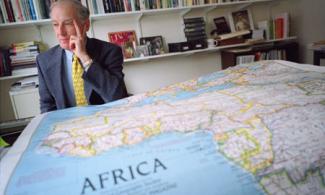
After a very warm welcome address by Prof. Chinua Achebe at the 2011 Achebe Colloquium on Africa this weekend at Brown University in Rhode Island, scholars embarked in a discussion on the Chinese presence in Africa.
After a very warm welcome address by Prof. Chinua Achebe at the 2011 Achebe Colloquium on Africa this weekend at Brown University in Rhode Island, scholars embarked in a discussion on the Chinese presence in Africa.
googletag.cmd.push(function() { googletag.display('content1'); });
While some of the panelists may not have gone as far to say that “China is Africa’s best hope,” as was noted by the President of the World Peace Foundation, Robert Rotberg, most expressed that China should be allowed to execute its capitalistic agenda in Africa.
“…For the last few decades, the West and the U.S., had engaged with China very profitably and this has been of the benefit of the 1.2 billion people in China…we are warning Africa to be aware of China… Africa is wondering why the West keeps on warning them to be aware of China when they [the West] have benefitted so much from China,” stated Deborah Brautigam from the School of International Service at American University.
Brautigam’s observation was a repeated theme among the panelists, which included Robert Rotberg; Walter Carrington, Former U.S. Ambassador to Nigeria and Angola; James Hentz, Head of Department and Professor of International Studies & Political Science at Virginia Military Institute; Scott Taylor, Director of African Studies, Georgetown University; Omer Ismail, Senior Policy Advisor, the Enough! Project.
For many policymakers and U.S.-sympathizers, China is emblematic of the Cold War, when it was a communist threat, and is a reminder of Japan, as an emerging power, “an economic butt-kicker” as Brautigam eloquently expressed.
But the agenda of China in Africa is clear and its foreign policy highlights the principles of 1) mutual benefits for all parties involved in trade and investment and 2) non-interference into the internal affairs of other countries.
The controversial handsoff approach is implemented in degrees, varying in relation to what is happening in the world. For example, during the early part of the conflict in Darfur, China’s role was, not good, to say the least. But after international pressure and as 2008 Olympic games approached, China stance on the violence in Darfur region changed. It’s quite similar to the evolution of Chinese policy in Angola, a poster child for corruption, which experienced an increase in Chinese trade and investment after peace was declared in 2002. Data shows that Angola’s economy has improved greatly, especially with Chinese presence and influence.
The consternation of the Chinese in Africa is felt mainly among Westerners, more so than Africans. Numerous studies illustrate an increasingly positive public opinion by Africans of China. A 2011 BBC World Service poll measured a 76 percentage of favorable views of the U.S. by Nigerians, and 85% for China. So essentially, according to the poll, Nigerians feel more positively toward China than the U.S.
The United States has hit a number of strikes that have downgraded its public opinion among Africans, as indicated by well-researched reports.
Scott Taylor referred to some of those areas that have resonated negatively among Africans.
1. the increased use of drones in Somalia
2. AFRICOMM
3. U.S. role in NATO in the removal of Muammar Gaddafi
4. President Barack Obama has not lived up to the expectations of many Africans
In conclusion, as many Africans gain more favorability in their perception of China, actions and policies from the Unites States continue to strike a negative cord.
In the implementation of its foreign policy tenet of mutualism for all parties involved in foreign trade and investment, China has begun and completed a number of infrastructural development projects throughout Africa that benefit the entire world, not just Africans and not just the Chinese. Railroads, telecommunications support, roads, airports…. the list goes on and on.
“If China is building railroads and roads to make it easier for them to transport goods, that means we can all use those roads…so it’s good for everyone. …I’m glad someone is building those roads…. They can’t put a sign that says ‘Sorry, only Chinese can travel here’ at least I don’t think so,” stated James Hentz of the Virginia Military Institute.
The irony, as expressed by experts, is that for decades, the West has encouraged capitalism and free trade for China and the Chinese, markedly with foreign trade and investment in Africa, is doing just that. So, what’s the real issue? What is the underlying problem?
Could this just be the anxiety of the global superpower of the United States resisting challenge from the rising power of China? Is China really an economic colonizer?
Let us just hope that the elephants are not fighting because when elephants fight, it is the grass that inevitably suffers.
Follow Chika Oduah @twitter.chikaoduah. www.chika-oduah.com
googletag.cmd.push(function() { googletag.display('comments'); });
googletag.cmd.push(function() { googletag.display('content2'); });